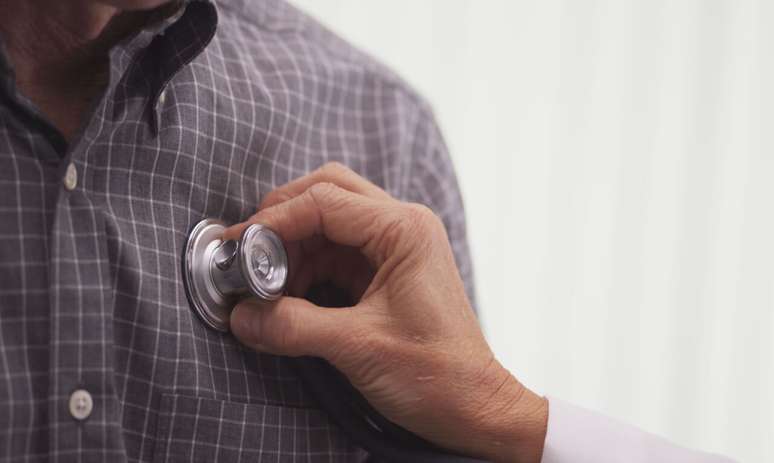In addition to a healthy lifestyle, cardiological control is the most suitable way to control and preserve heart health
The Ministry of Health estimates that 14 million people have a heart problem and at least 400,000 die every year. In addition, it is noteworthy that cardiovascular diseases are the main cause of death in Brazil, corresponding to 30% of all deaths in the country. This scenario indicates the importance of keeping heart health updated, especially through cardiological control.
Cardiologist Dr. Marcelo Ferraz Sampaio explains that clinical history and physical examination are important to prevent and keep track of cardiovascular complications. “This is because with a good cardiac auscultation, it is possible to get a lot of information,” he comments. At this stage the vital signs, palpation and ausultation of the impulses, observation of the veins, inspection and palpation of the chest and percussion are assessed.
Symptoms indicating a heart problem
Marcelo recommends looking for a health professional every time he has one or more symptoms below:
- Chest pain;
- Dizziness;
- Palpitation or lack of breath, generally associated with great physical effort;
- Night sweats;
- Swelling in the legs that can reflect on the edema;
- Swelling in the belly;
- Cholesterol, blood sugar or high blood pressure.
The cardiologist also recalls that excess cholesterol can accumulate and lead to the formation of fat plates, for example. The consequence is the increase in the risk of cardiovascular diseases.
Risk factors for heart disease
The risk factors vary considerably, the professional highlights. The doctor quotes, for example:
- Smoke;
- Exaggerated consumption of alcohol;
- Hypertension;
- Obesity;
- Stress;
- Depression;
- Physical inactivity;
- Air pollution;
- Night apnea;
- Thyroid disorders;
- Diabetes (because diabetic patients are twice as a possibility of suffering from a heart attack).
In addition, genetic inheritance is another aspect that influences the probability of presence of diseases. “If parents show these problems in advance, being men under the age of 50 and women under 60 years of age, the child should examine up to 12 years”, says Dr. Marcelo. The doctor also recommends cardiac evaluation every five years and strengthens periodic monitoring especially after 40 years.
7 exams present at cardiological check-up
Due to the intermittent feature of some heart disease, it is possible that they are not initially identified. Therefore, complementary procedures are needed, explains Dr. Marcelo. The expert lists seven exams that can be done to control heart health:
- Electrocardiogram: Monitor the heart from electrodes on the skin and the electrical signal is transcribed on paper, allowing to analyze the heart rate;
- Echocardiogram: Use sound waves to get images of the heart;
- Scintigraphy for myocardial perfusion: Detects the radiation emitted by the injection of a radiopharmaceutical, allowing to view the bloodstream that feeds the main muscles of the heart;
- Computerized tomography of the coronary arteries: Use X -rays to evaluate the blood vessels that provide cardiac muscle;
- RHeart Ession: Use a magnetic field to capture the details of the cardiac structure;
- Operating test: Analyzes the way the patient reacts when he underwent a physical effort on a treadmill or a bicycle;
- Blood exams: Information on the dosages of cardiac enzymes and type B nitruretic peptides contributes, a hormone indicating a degree of heart failure and is released by the ventricles when the heart suffers from aggression.
Prevention
Whatever the care of the heart, prevention remains the best way, it highlights Marcelo. In addition to cardiological control, it is possible to take measures that help to maintain a healthy heart rate. Thinking about it, the doctor gives some suggestions:
- Transform the balanced diet into a permanent habit;
- Exercise regularly. Therefore, choose the most pleasant activity;
- Eliminate smoking and use of other types of drugs;
- Avoid excessive consumption of alcohol, coffee, energy and types of tea that have a lot of caffeine, such as companion and green tea, for example;
- Check the stress and take care of emotional health;
- Sleeping good hours of sleep, because rest is essential for heart health.
Source: Terra
Ben Stock is a lifestyle journalist and author at Gossipify. He writes about topics such as health, wellness, travel, food and home decor. He provides practical advice and inspiration to improve well-being, keeps readers up to date with latest lifestyle news and trends, known for his engaging writing style, in-depth analysis and unique perspectives.








